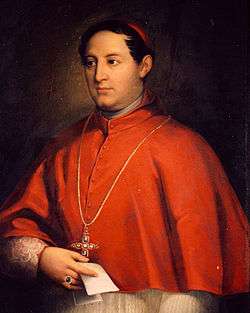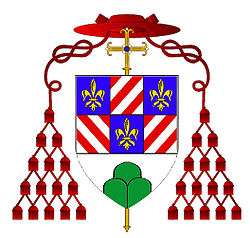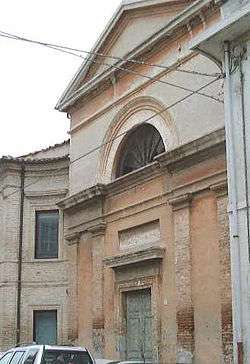Gaetano Bedini

Gaetano Bedini (15 May 1806 – 6 September 1864) was an Italian ecclesiastic, Cardinal and diplomat of the Catholic Church.
Biography
Bedini was born in Senigallia into the peasant Bedini family of Ostra, the son of Alessandro Pellegrino and Marianna Spadoni.
The youngest of 7 sons, Bedini was intended by his father to be a priest. He entered the seminary at Senigallia and was ordained a Roman Catholic priest on 20 December 1828 by Cardinal Fabrizio Sceberras Testaferrata. In the following years he became canon of the cathedral of Senigallia (1829–1838).
Thanks to influential friends, including Giovanni Mastai Ferretti (the future Pope Pius IX, also native of Senigallia), he dedicated himself to politics. He was secretary of Lodovico Altieri, archbishop of Ephesus and nuncio in Austria from 1838 to 1845. When Lodovico Altieri was named cardinal, Bedini gained exposure to the diplomatic atmosphere, and he was subsequently called to Rome as Papal Chamberlain of Gregorius XVI and the Protonotary apostolic.
Apostolic nunziatura in Brazil
The first important assignment received by Bedini was that of Internuncio in Brazil, from 28 October 1845 to 16 August 1847. He worked for the improvement of the living conditions of German immigrants and supported Catholicism against the Protestant proselytism. His work led the Chamber of Deputies of Rio de Janeiro to improve the living conditions of the German immigrants.

Contacts with Garibaldi
Giuseppe Garibaldi, who was also living in South America at the time, wrote a famous letter to Bedini in 1847 in which he declared “to offer to Pius IX its sword and the Italian legion for the native land and the church” remembering “the garnishments of our August religion, always new and always immortal” knowing that “the throne of Peter rests over such foundations that don't need aid, because the human forces cannot shake them”. Bedini replied thanking him, but the offer to Rome of the legion Rome was never received.
Roman Republic and legation in Bologna
Returning to Rome in March 1848, Bedini replaced the Cardinal Secretary of State Giacomo Antonelli, from 10 March 1848 until November 1848 following Pius IX when he was forced into exile in Gaeta, by the Roman Republic (1849) revolution in Rome.
Once the Pope had recovered his temporal power, Bedini continued his job of Papal Nuncio and commissioner in the Legations and ambassador to Bologna from 1849 to 1852. Just at the beginning of that period, Ugo Bassi was captured at Comacchio and executed on 8 August 1849 in Bologna by the Austrians. Many patriots accused Bedini of nonintervention in order to save himself.
In his position at Bologna, however, he restored the Palace of Accursio with the restyling of Sala Urbana and the construction of the Aula Piana, he adopted provisions for the unemployed, favoured commerce with the construction of new roads, promoted agriculture and restored important artistic monuments like the Villa S. Michele in Foresta.

Apostolic Nunciatura in USA
On 15 March 1852 he was named titular Archbishop of Thebes and three days after Apostolic Nuncio in Brazil. Once he received the archiepiscopal order on 4 July 1852 from cardinal Luigi Lambruschini, he decided to leave for Brazil, but he could not enter the country because of a plague epidemic so he went to the United States. He was the first Papal Nuncio in the United States.
He arrived in New York on 30 June 1853. He became the target of attacks by non-Catholics because of his role in overthrowing the Anti-Papal Roman Republic in 1849, and his visit triggered the Cincinnati Riot of 1853 in which several hundred men marched in protest against his visit.[1]
While travelling, Bedini met the president of the United States, Franklin Pierce, to whom he delivered a letter from the Pope, and the American Secretary of State William L. Marcy. He ordained some new bishops amongst whom were James Roosevelt Bayley archbishop of the Archdiocese of Newark, John Loughlin bishop of the diocese of Brooklyn and Louis De Goesbriand bishop of the diocese of Burlington. After visiting New York, Pittsburgh, Louisville, Baltimore and Philadelphia, he returned to Rome from New Orleans in January 1854.
Job in Curia
After returning to Italy he worked more intensely in the Roman Curia. On 20 June 1856 he was named General Secretary of the Sacred Congregation for the Propaganda of the Faith. He also initiated some plans such as the constitution of the North American College to Rome that with his aid had bought a building in Humility Street on 22 September 1858. After having resolved all the bureaucratic problems this institute was inaugurated on 8 December 1859.

Cardinal of Viterbo
In March 1861, he was named Bishop of Viterbo and Tuscanella (today's Tuscania). He entered in city 8 May 1861 from met Roman Door from the Community and the Clergy, and it oed in cathedral through the illuminated ways.
Zealous it opened endured the S. pastoral Visit oing in several the countries of the diocese and taking care a lot of the devout places, the monasteri and especially of the Seminary, where deep plentiful sums much to leave not light debits its dead women; in it improves the instruction (calling from Bagnoregio the clearest one prot. Artemi for the rhetorical school), the cleanness of i|premises and thought to magnify of the manufactured one with the purchase of the Cristofari palace.
27 September1861 was created Cardinal of the Order of the Priests titular of the church of Santa Maria sopra Minerva.
Death
He died in the morning of 6 September 1864 at 59 years old, probably for an apoplectic stroke. The pain of the city of Viterbo to the unexpected news was immense. They were quite it sends back events very important for the city as the tombola of Rosa Saint and the fireworks them, and was closed the theatre in sign of mourning, although in city there was very many people. He was buried in the Cathedral of the city, in a beautiful monument in marble, near Saint and bishop his predecessor.
See also
| Wikimedia Commons has media related to Bedini. |
References
- Artemi, Pietro - Elogio funebre del cardinale Gaetano Bedini Arciv. Vescovo di Viterbo e Toscanella letto de' solenni funerali degli 8 settembri 1864 nella chiesa cattedrale viterbese / - Viterbo - 1864
- Bedini, Gaetano - Agli alunni del Pontificio Collegio Urbano in propaganda : parole dette da Monsig. Gaetano Bedini nella solenne messa pontificale per l'Epifania del 1861 - Roma - 1861
- Bedini, Gaetano - 14 you open them 1850. State of the Church, Papal Government. We Gaetano Bedini, Patrizio Sinigalliese… Extraordinary Papal Commissioner of S.S. Pope Pio IX and For-Legacy of Bologna. People of the Legations. … Today he is given us of being able to you to announce that Devout immortale already IX is found in its Rome and with It shines of new in the Vatican the twofold Maestà of the Pontefice and the Monarch… - Bologna, Governmental Printing office to the Vixen. Millimeter 781x530.
- Biographical Dictionary of the Italians - pp. 520–522
-
 "Cajetan Bedini". Catholic Encyclopedia. New York: Robert Appleton Company. 1913.
"Cajetan Bedini". Catholic Encyclopedia. New York: Robert Appleton Company. 1913. - Connelly, James F. - The visit of archbishop Gaetano Bedini to the United States of America (June, 1853 - February, 1854) / James F. Connelly - Roma - 1960
- Sanfilippo, Matteo - Monsignor Gaetano Bedini and the emigration towards the Americas in Studies Emigration - 106 (1992) - pp. 277–286 53.
- Polverari, Alberto - Cronotassi of the bishops of Senigallia - p. 142
- Mencucci, Mons. Angel - Senigallia and its Diocese - and Fortune - pp. 139–147
- Mounts Guarnieri, Giovanni - Annals of Senigallia - tip. Situated - Ancona - p. 315-316 377
- Vatican Secret Archives, Sacrae Visitationes - “Visit Gaetano Bedini, 1861” - vol. I-VI
- ↑ James F. Connelly (1960). The visit of Archbishop Gaetano Bedini to the United States of America: June 1853-February 1854. Editrice Pontificia Università Gregoriana. p. 96ff. ISBN 88-7652-082-1.
External links
| Preceded by Tommaso Pasquale Gizzi |
Archbishop of Thebes 1852–1861 |
Succeeded by Mieczysław Halka Ledóchowski |
| Preceded by Matteo Eustachio Gonella |
Archbishop of Viterbo 1861–1864 |
Succeeded by Gaspare Bernardo Pianetti |
| Preceded by Matteo Eustachio Gonella |
Cardinal Priest of Santa Maria sopra Minerva 1861–1864 |
Succeeded by Francesco Gaude |
|